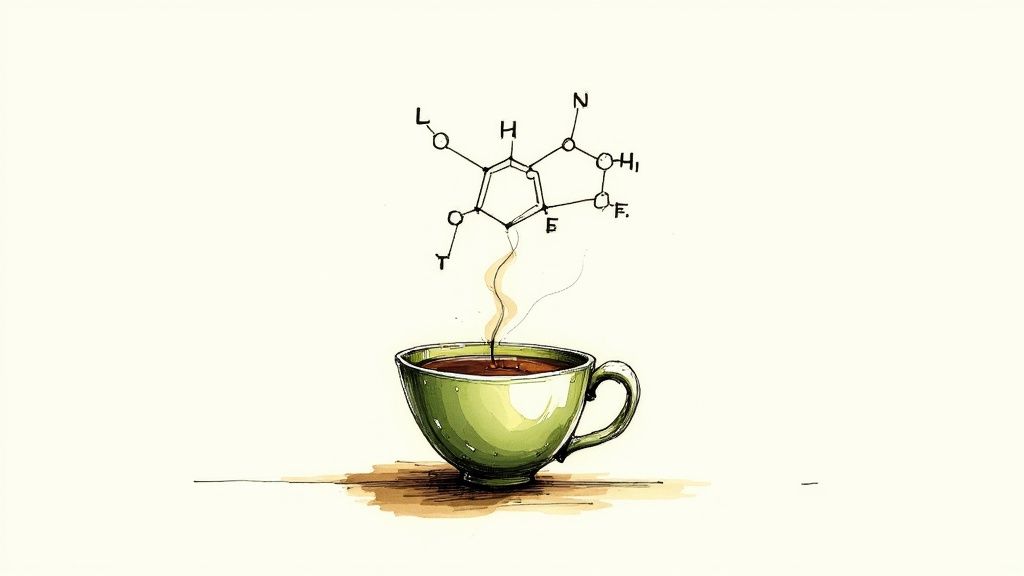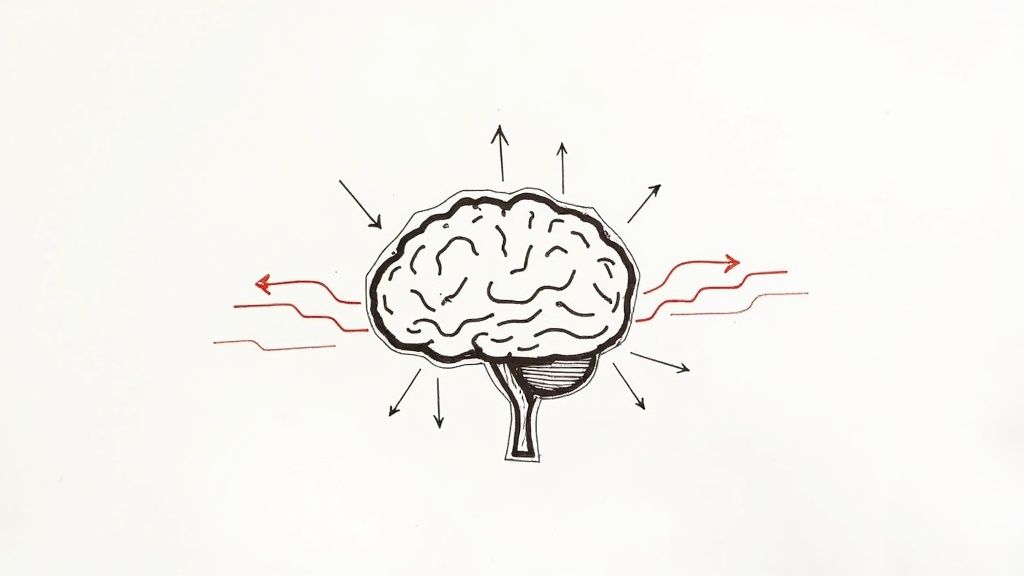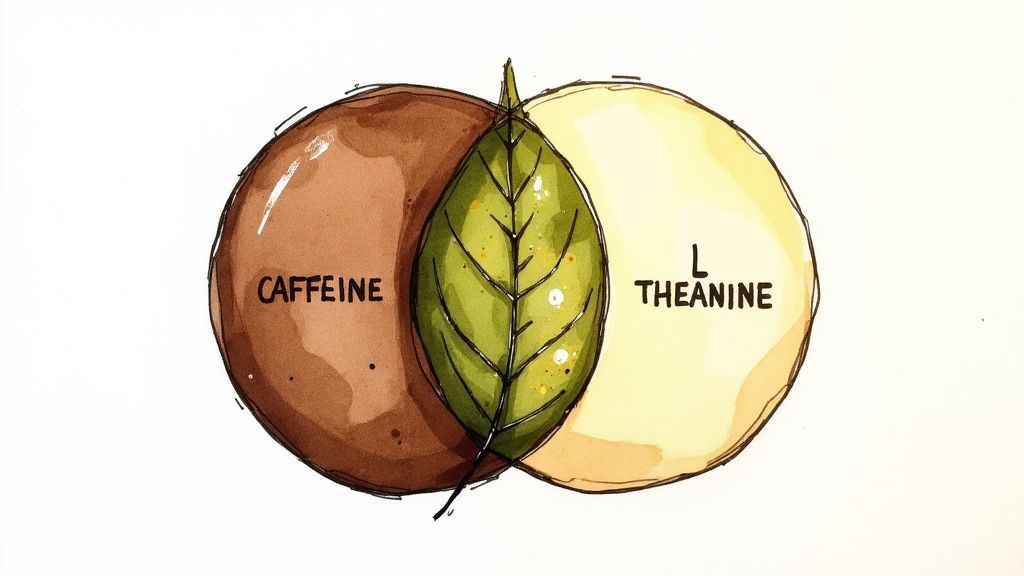What is L-Theanine?

L-theanine is a unique amino acid found primarily in tea plants (Camellia sinensis) and some mushrooms. This means common beverages like green, black, and white tea all contain this fascinating compound. However, it's more than just a simple ingredient; l-theanine plays a crucial role in the overall sensory experience of drinking tea. It acts like a subtle conductor, influencing caffeine's effects and contributing to the calming yet focused feeling many tea drinkers enjoy. This interaction between l-theanine and caffeine is essential to understanding how tea affects us.
How Does L-Theanine Occur in Tea?
L-theanine's presence in tea is entirely natural, affected by factors such as the plant's growing conditions. For instance, tea plants cultivated in shade, like those used for matcha and gyokuro, typically have higher l-theanine levels. This is because shading creates stress for the plant, triggering it to produce more l-theanine, almost as a form of self-preservation. Furthermore, the specific processing methods for different tea types also impact the final l-theanine concentration. As a result, l-theanine content varies between different teas, impacting their individual effects on the drinker. This variation contributes to the wide range of experiences offered by different types of tea.
L-Theanine's Molecular Structure
Scientifically, l-theanine is an analogue of glutamate and glutamine, two important neurotransmitters in the brain. This structural resemblance allows l-theanine to cross the blood-brain barrier, directly affecting brain activity. It's like having a key that fits a specific lock, enabling access to the brain's control center. Because of its similarity to glutamate and glutamine, l-theanine can interact with specific receptors in the brain, influencing neurotransmitter activity and ultimately affecting mood and cognitive function. This ability to impact brain chemistry is what makes l-theanine so intriguing and contributes to its potential benefits for both relaxation and focus. These benefits are what draw many people to explore the world of tea and its unique effects.
Types of Tea Rich in L-Theanine

As we've discussed, l-theanine naturally occurs in the Camellia sinensis plant, the origin of all true teas. However, the concentration of l-theanine within the tea varies depending on the type and processing. This means choosing the right tea can significantly affect your l-theanine intake. Let's explore the specific teas known for their higher l-theanine content. This knowledge will empower you to make informed choices about your tea selection.
Green Tea: A Notable Source of L-Theanine
Green tea, known for its subtle flavor and health benefits, is a significant source of l-theanine. While the amount can fluctuate, certain green teas are particularly rich in this amino acid. Matcha, for instance, a vibrant green powder made from shade-grown leaves, is renowned for its exceptionally high l-theanine content. The shading process, as mentioned earlier, stresses the plant, causing it to produce more l-theanine. Similarly, gyokuro, another shade-grown Japanese green tea, also boasts high l-theanine levels. This contributes to their smooth, umami taste and promotes a sense of calm focus. Even standard sencha, though not shade-grown, offers a good amount of l-theanine. Therefore, incorporating these green teas into your routine is a great way to enjoy the advantages of l-theanine. This consistent intake can contribute to a greater sense of well-being.
Exploring L-Theanine in Other Tea Types
Although green tea is often emphasized for its l-theanine content, other tea types also contain this valuable amino acid. White tea, the least processed type, retains a good amount of l-theanine, although generally less than green tea. This is because minimal processing helps preserve the natural compounds in the leaves. Conversely, black tea undergoes extensive oxidation, which can reduce l-theanine levels. While a cup of black tea still provides some l-theanine, the amount is typically lower than in green or white tea, potentially explaining why the stimulating effects of caffeine are more noticeable in black tea. Finally, oolong tea, positioned between green and black tea in terms of oxidation, offers varying l-theanine levels depending on the specific variety and processing method. Understanding these differences allows you to choose the tea best suited to your personal preferences and desired l-theanine intake. This informed choice allows you to tailor your tea experience to your specific needs.
Maximizing L-Theanine in Your Cup
Beyond selecting the right tea, brewing methods can also affect how much l-theanine is extracted. Just as a French press coffee extracts more flavor compared to drip coffee, steeping tea leaves longer at lower temperatures can maximize l-theanine extraction. For example, brewing green tea around 170°F (77°C) for 2-3 minutes typically yields a higher l-theanine concentration than using boiling water. This is because excessive heat can degrade sensitive compounds in tea, including l-theanine. Therefore, paying attention to brewing techniques is crucial for maximizing the enjoyment and benefits of l-theanine in your cup. Specialized brewing methods, like using a kyusu teapot for gyokuro or whisking matcha, can further enhance the experience. These nuanced approaches demonstrate the depth and richness of tea culture.
Health Benefits and Effects
Now that we understand l-theanine in tea, let's explore its potential health benefits and effects. While previous sections touched upon its role in the overall tea experience, this section will examine the science-backed ways l-theanine influences mental clarity and encourages relaxation. This delicate balance, a hallmark of l-theanine, makes it stand out and contributes to tea's unique appeal. Understanding these effects allows us to appreciate the multifaceted nature of this remarkable compound.
Mental Clarity and Focus: The L-Theanine Advantage
L-theanine doesn't just relax you; it cultivates a state of calm focus. Like a conductor leading an orchestra, it subtly guides brain activity toward a harmonious state, promoting attention and concentration without the jitters sometimes associated with caffeine. This is partly due to its influence on alpha brain wave activity, which creates a sense of relaxed alertness. Students, for example, might find l-theanine helps them focus on studying without feeling overwhelmed. Similarly, professionals facing challenging tasks could benefit from the enhanced focus l-theanine provides, enabling them to manage complex projects more efficiently. This clear-headed calmness sets l-theanine apart, making it a potentially valuable tool for boosting cognitive performance. This potential has spurred extensive research into l-theanine's effects on the brain.
Relaxation Without Drowsiness: A Unique Balancing Act
One of l-theanine's most fascinating qualities is promoting relaxation without causing drowsiness. Imagine gently lowering the volume on background mental noise. It doesn't induce sleepiness but creates tranquility and reduces mental clutter. This is particularly useful for managing stress and anxiety. For instance, after a stressful day, a cup of l-theanine-rich tea can help you unwind without causing sluggishness. This distinct effect results from l-theanine's interaction with neurotransmitters, modulating the stress response and promoting a sense of calm. This is why l-theanine is often associated with "relaxed alertness," a state of both calm and focus. This makes it ideal for various situations, from concentrating at work to unwinding in the evening. This versatility makes l-theanine a valuable asset in our daily lives.
Stress and Anxiety Reduction: L-Theanine's Calming Influence
In our stress-filled world, effective stress management is essential for well-being. L-theanine shows promise as a natural stress management aid, helping modulate the body's stress response and reducing feelings of being overwhelmed. Like adjusting a thermostat, l-theanine helps regulate your internal "stress thermostat," preventing it from overheating. This effect is particularly noticeable when l-theanine is combined with caffeine, as in tea. The l-theanine balances caffeine's potentially jittery effects, creating a calm energy. This synergistic relationship is another reason l-theanine in tea is effective for managing stress and promoting a sense of overall well-being. Beyond managing existing stress, l-theanine may also strengthen the body's resilience to future stressors, much like reinforcing a house's foundation. This makes it valuable for proactive stress management, helping you cope better with life's challenges. Learn more in our article about The Health Benefits of Matcha Tea. This dual ability to reduce current stress and build future resilience makes l-theanine a powerful ally in navigating modern life's complexities. It provides a gentle path to balance and mental wellness.
Supporting Sleep Quality: The Gentle Nighttime Ally
While not a sedative, l-theanine can improve sleep quality by promoting relaxation and reducing anxiety. Like preparing fertile ground for a plant, l-theanine creates a more conducive environment for restful sleep by calming the mind and easing tension. This is helpful for those who struggle with racing thoughts or anxiety at bedtime. By fostering tranquility, l-theanine helps prepare the body for a smoother transition into sleep, potentially improving sleep efficiency and reducing time spent tossing and turning. It can also minimize nighttime awakenings, allowing for a more continuous sleep cycle. This leads to waking up feeling more refreshed and energized. L-theanine's subtle yet profound impact on sleep highlights its versatility and potential to support overall well-being. It reinforces the idea that l-theanine in tea enhances various aspects of our health, including restorative sleep. This underscores the importance of considering tea not just as a beverage, but as a contributor to overall wellness.
Brain Chemistry and L-Theanine

Understanding l-theanine goes beyond the tea plant itself and into the fascinating realm of brain chemistry. How does this unique amino acid influence our brains? This intricate interplay within our neurochemistry contributes to l-theanine's distinctive effects. Exploring this connection further illuminates how l-theanine impacts our mental and physical states.
Neurotransmitters and the Impact of L-Theanine
L-theanine's ability to cross the blood-brain barrier is crucial to understanding its effects. This barrier acts as a gatekeeper, controlling which substances can enter the brain. Because of its structural similarity to glutamate and glutamine, l-theanine can pass through this barrier and interact directly with neurotransmitters, the brain's chemical messengers. This interaction is like a carefully choreographed dance, with l-theanine subtly influencing the activity of several neurotransmitters. This intricate interaction contributes to the overall effect of l-theanine on the brain.
The Role of GABA and Dopamine
L-theanine's interaction with GABA, a neurotransmitter known for its calming effects, is particularly significant. L-theanine is believed to increase GABA levels, which promotes relaxation and reduces anxiety. Think of GABA as a gentle brake on brain activity, quieting mental "noise" and promoting calm. L-theanine also influences dopamine, a neurotransmitter associated with pleasure and motivation. By modulating dopamine levels, l-theanine can contribute to a sense of well-being and lift mood. This balanced influence on key neurotransmitters like GABA and dopamine helps explain the unique effects of l-theanine in tea. The interplay of these neurotransmitters creates a nuanced effect on the brain.
Alpha Brain Waves and Relaxed Alertness
Another fascinating aspect of l-theanine's influence is its effect on alpha brain waves, which are associated with relaxed alertness — that feeling of being calm yet focused. L-theanine is thought to promote alpha wave activity, fostering mental clarity without drowsiness. While other relaxing agents might induce sleepiness, l-theanine helps you remain alert and focused while experiencing a sense of calm. Imagine trying to concentrate on a complex task while feeling stressed and anxious. L-theanine, by promoting alpha brain waves, can potentially create the ideal mental state for concentration and productivity. This ability to support relaxed alertness makes l-theanine a valuable tool for various activities, from studying and working to engaging in creative pursuits. This adaptability makes l-theanine a welcome addition to many different scenarios.
Glutamate Regulation: Balancing Excitation
L-theanine also plays a role in regulating glutamate, the primary excitatory neurotransmitter in the brain. While glutamate is essential for learning and memory, excessive glutamate activity can cause anxiety and restlessness. L-theanine helps modulate glutamate activity, preventing it from becoming overstimulating. Visualize this as a dimmer switch, adjusting the intensity of glutamate's effects. This regulatory function is particularly important when considering the combined effects of l-theanine and caffeine in tea. Caffeine, a stimulant, can increase glutamate activity. However, the presence of l-theanine counterbalances this effect, leading to a more balanced brain state. This explains why tea, despite containing caffeine, often promotes calm focus rather than jittery stimulation. This delicate balancing act within brain chemistry highlights the synergy between l-theanine and caffeine, contributing to tea's unique beneficial effects. It's this precise interaction that sets the experience of tea apart from other caffeinated beverages. This balance is key to tea's widespread appeal.
Synergy with Caffeine

Understanding tea's individual components, like l-theanine, is important, but the true magic lies in how they interact. This section explores the remarkable synergy between l-theanine and caffeine, a relationship that defines the unique experience of tea drinking. This powerful combination provides a balanced approach to energy and focus, making tea a beloved beverage worldwide.
A Balancing Act: L-theanine and Caffeine's Complementary Effects
Caffeine is known for its stimulating properties, while l-theanine provides a calming counterpoint. Picture a seesaw: caffeine lifts you up, and l-theanine provides a gentle grounding force. This interplay creates "relaxed alertness," allowing you to experience caffeine's increased energy and focus without the jitters or anxiety it can sometimes cause. Instead of the sharp spike and subsequent crash often felt with coffee, tea offers a smoother, more sustained lift. This is thanks to l-theanine modulating caffeine's effects, promoting a more balanced experience. This synergy transforms the typical caffeine experience into something more nuanced and beneficial. The combination of these two compounds creates a unique effect not found in other beverages.
Enhancing Focus and Concentration: The Power of Combined Action
The combined action of l-theanine and caffeine does more than mitigate caffeine's negative side effects; it actively enhances cognitive function. Think of it like fine-tuning a musical instrument: caffeine increases the volume (alertness), while l-theanine clarifies the individual notes (focus). This synergistic effect can lead to improved attention span, enhanced concentration, and increased productivity. Studies have shown this combination can improve performance on tasks requiring sustained attention and mental acuity. L-theanine in tea, working together with caffeine, can be a valuable asset for anyone seeking to optimize their cognitive performance, from students studying for exams to professionals handling demanding projects. The potential benefits of this combination make it a worthwhile subject of further research.
Mitigating Caffeine's Jitters: The Calming Influence of L-theanine
One of the most appreciated benefits of l-theanine in tea is its ability to smooth out caffeine's sometimes unpleasant side effects. Many people experience jitters, anxiety, or a racing heart after consuming caffeine. L-theanine acts like a buffer, lessening these effects and promoting a calmer experience. It's like adding a shock absorber to a car — l-theanine softens the impact of caffeine, creating a smoother, more comfortable ride. This allows caffeine-sensitive individuals to enjoy tea without the negative side effects, which is why tea is often preferred over coffee by those seeking a gentler, more balanced energy source. This ability to enjoy caffeine's benefits without the jitters highlights the unique synergy between l-theanine and caffeine in tea. It allows for a more enjoyable and sustainable approach to boosting alertness and focus. This delicate balance distinguishes the tea-drinking experience.
The Unique Tea Experience: A Harmonious Blend
The synergy between l-theanine and caffeine truly sets tea apart from other caffeinated beverages. This combination creates a unique experience that is both stimulating and calming, promoting a sense of balanced energy and focused attention. It's not just the sum of its parts, but a harmonious blend creating a symphony of effects that enhance both physical and mental well-being. This explains why tea has been enjoyed for centuries across cultures, not just as a drink, but as a ritual promoting both tranquility and focus. The interplay of l-theanine and caffeine in tea demonstrates the power of natural synergy, a delicate balance offering a refreshing and sustainable approach to enhancing our lives. This harmony makes l-theanine in tea a valuable tool for navigating modern life, providing both the focus to achieve our goals and the calm to maintain our well-being. This balance is key to tea's enduring popularity.
Best Time to Consume
Understanding the benefits of l-theanine is one thing, but knowing when to consume it for optimal effect enhances the experience. Timing your tea consumption can influence how l-theanine works, maximizing its potential to benefit your day. This thoughtful approach allows you to harness l-theanine's power more effectively, aligning it with your daily rhythm.
Morning Calm and Focus: Starting the Day with L-Theanine
Start your day with a cup of l-theanine-rich tea, like matcha or gyokuro. The combined effect of l-theanine and caffeine provides a gentle, focused start without the jitters some experience with coffee. This can boost concentration during morning tasks and meetings. Instead of coffee that might leave you feeling wired and then crashing later, l-theanine-rich tea can offer sustained focus and energy throughout the morning, setting a positive and productive tone for the day. This gentle yet effective start can make a significant difference in your overall daily performance.
Afternoon Slump Solution: L-Theanine for a Mid-Day Boost
Counter the afternoon slump with l-theanine. Instead of succumbing to drowsiness and reduced productivity, a cup of green or white tea can provide a refreshing lift. The l-theanine can sharpen focus and improve concentration without disrupting sleep the way a late-day coffee might. This makes tea a valuable tool for maintaining energy and productivity throughout the workday, bridging the gap between lunch and the end of the day. It offers a sustainable way to combat the natural energy dips that can occur during the afternoon.
Evening Relaxation: Unwinding with L-Theanine
L-theanine can be a beneficial part of your evening wind-down routine. While not a sedative, its calming properties can prepare your body for sleep. A cup of tea with lower caffeine, such as decaf green tea or white tea, promotes relaxation without keeping you awake. Enjoying a warm cup of tea in the evening can be a calming ritual, signaling the transition from a busy day to a peaceful night. L-theanine supports better sleep quality by easing stress and promoting tranquility before bed. This ritualistic approach can enhance the psychological benefits of l-theanine.
L-Theanine and Mealtimes: Considerations for Consumption
While there aren't strict rules about consuming l-theanine with meals, some considerations might enhance its benefits. Studies suggest l-theanine absorption might be slightly enhanced when consumed on an empty stomach. However, enjoying l-theanine in tea with a meal can also be a pleasant and beneficial experience, allowing you to incorporate it without disrupting your meal patterns. Ultimately, the best time to consume l-theanine depends on individual needs and preferences. Experiment to find what works best for you. Whether you want a focused start to your day, an afternoon pick-me-up, or a calming evening ritual, l-theanine in tea offers a versatile approach to enhancing well-being. This personalized approach ensures you're maximizing its benefits in a way that suits your lifestyle. This flexibility makes l-theanine a valuable addition to a variety of routines.
Dosage and Safety
After exploring l-theanine's synergy with caffeine, let's consider the practical aspects of incorporating it into your routine. This brings us to the important topic of dosage and safety, ensuring you can confidently enjoy l-theanine's benefits. Understanding these guidelines allows you to maximize the positive effects while minimizing any potential risks. This knowledge empowers you to make informed decisions about your l-theanine intake.
Recommended Dosage: Finding Your L-Theanine Sweet Spot
While the ideal l-theanine dosage varies based on individual needs and sensitivities, general guidelines recommend 200-400mg per day. This is easily achieved through regular tea consumption. A cup of matcha, for instance, can contain between 25mg and 60mg of l-theanine, while other green teas typically contain less. Enjoying several cups throughout the day can provide a significant amount within the recommended range. Start with a lower dose and gradually increase as needed, paying attention to your body's response. This helps you find your "l-theanine sweet spot," the dosage offering optimal benefits without adverse effects. This personalized approach is key to maximizing the benefits while maintaining safety.
Safety Considerations: Enjoying L-Theanine Responsibly
L-theanine is generally considered safe, with a long history of use in tea. However, like any supplement or dietary change, be mindful of potential interactions and practice moderation. Individuals with low blood pressure should consult a healthcare professional before taking l-theanine supplements, as it may lower blood pressure further. While l-theanine is known for its calming properties, excessive intake could potentially cause drowsiness or lethargy in some individuals. Adhering to recommended dosages and monitoring your body's reaction is essential. Just like finding the right balance of ingredients in a recipe, finding the correct amount of l-theanine for your individual needs is crucial for maximizing its benefits and ensuring a safe and enjoyable experience. This careful approach allows you to incorporate l-theanine into your routine with confidence.
L-Theanine and Medications: Potential Interactions
While generally safe, l-theanine may interact with certain medications. Individuals taking blood pressure medication or stimulants should consult their doctor before adding l-theanine to their routine, as it can lower blood pressure and potentially interact with these medications' effects. This proactive approach helps avoid complications. Like a conductor carefully orchestrating different instruments, considering potential interactions helps ensure l-theanine harmonizes with any existing medications, which is particularly crucial for those managing specific health conditions. This ensures the safe and effective integration of l-theanine into their overall health plan. This careful approach is essential for maximizing benefits while minimizing risks.
Enjoying the Benefits of L-Theanine in Tea: A Natural Approach
Incorporating l-theanine in tea into your daily routine is a natural and enjoyable way to experience its many benefits. From promoting relaxation and focus to supporting better sleep, l-theanine provides a gentle yet powerful way to enhance well-being. Understanding recommended dosages and safety considerations allows you to confidently explore the world of l-theanine and discover how it can best support your individual health and wellness goals. This exploration can lead to a more balanced and fulfilling life.
Ready to experience the calming focus and numerous benefits of L-theanine? Explore the world of matcha and other fine teas at matcha-tea.com and discover the perfect blend for your needs. Start your journey to enhanced well-being today!
